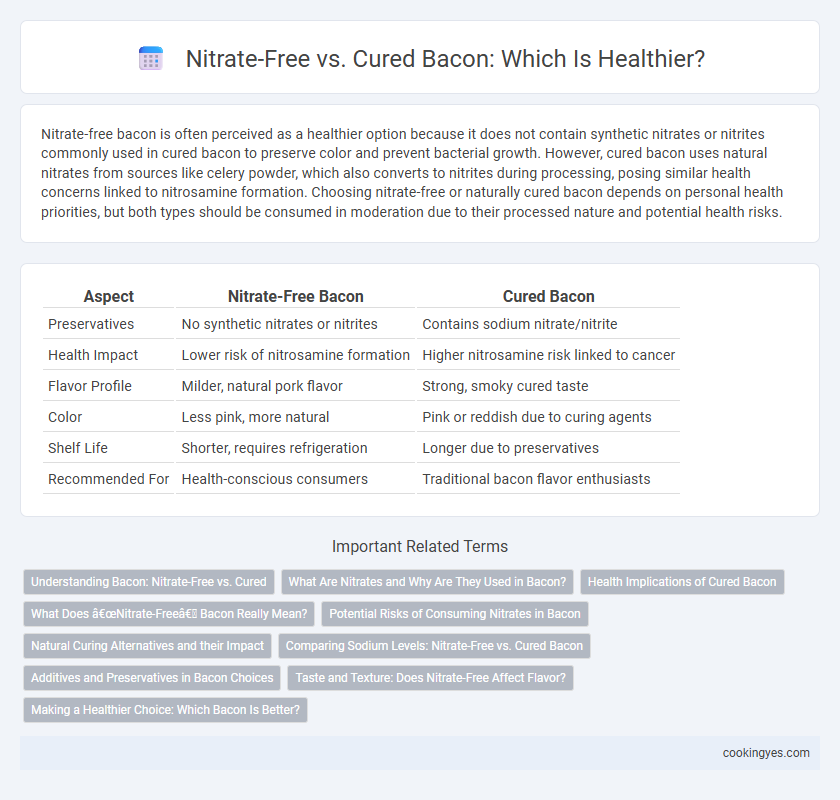Nitrate-free bacon is often perceived as a healthier option because it does not contain synthetic nitrates or nitrites commonly used in cured bacon to preserve color and prevent bacterial growth. However, cured bacon uses natural nitrates from sources like celery powder, which also converts to nitrites during processing, posing similar health concerns linked to nitrosamine formation. Choosing nitrate-free or naturally cured bacon depends on personal health priorities, but both types should be consumed in moderation due to their processed nature and potential health risks.
Table of Comparison
| Aspect | Nitrate-Free Bacon | Cured Bacon |
|---|---|---|
| Preservatives | No synthetic nitrates or nitrites | Contains sodium nitrate/nitrite |
| Health Impact | Lower risk of nitrosamine formation | Higher nitrosamine risk linked to cancer |
| Flavor Profile | Milder, natural pork flavor | Strong, smoky cured taste |
| Color | Less pink, more natural | Pink or reddish due to curing agents |
| Shelf Life | Shorter, requires refrigeration | Longer due to preservatives |
| Recommended For | Health-conscious consumers | Traditional bacon flavor enthusiasts |
Understanding Bacon: Nitrate-Free vs. Cured
Nitrate-free bacon is made without synthetic nitrates or nitrites, often relying on natural preservatives like celery powder, which still contain naturally occurring nitrates but in lower concentrations. Cured bacon uses nitrates or nitrites to enhance flavor, color, and shelf life, but these compounds can form potentially harmful nitrosamines when cooked at high temperatures. Opting for nitrate-free bacon may reduce exposure to nitrosamines, though both types should be consumed in moderation as part of a balanced diet to minimize health risks.
What Are Nitrates and Why Are They Used in Bacon?
Nitrates are naturally occurring compounds commonly added to bacon as preservatives to inhibit bacterial growth and enhance flavor and color. They convert into nitrites during curing, which help prevent botulism and maintain the bacon's pink hue. Though nitrates improve safety and shelf life, concerns about potential health risks from nitrosamine formation have led to increased demand for nitrate-free bacon options.
Health Implications of Cured Bacon
Cured bacon contains nitrates or nitrites that preserve flavor and color but may form potentially carcinogenic nitrosamines during high-temperature cooking. These compounds have been linked to increased risks of certain cancers, particularly colorectal cancer, prompting health concerns about regular consumption of cured bacon. Choosing nitrate-free bacon reduces exposure to synthetic nitrates, though natural sources like celery powder are often used, still posing some health considerations.
What Does “Nitrate-Free” Bacon Really Mean?
"Nitrate-free" bacon indicates that no synthetic nitrates or nitrites were added during processing, but it may still contain naturally occurring nitrates from ingredients like celery powder or sea salt used for curing. These natural nitrates convert to nitrites during curing, playing a similar role in preserving the meat and enhancing flavor while avoiding synthetic additives. Understanding that "nitrate-free" labels often mean "no synthetic nitrates" highlights the importance of reading ingredient lists to assess true differences in bacon processing and potential health impacts.
Potential Risks of Consuming Nitrates in Bacon
Consuming nitrate-containing cured bacon poses potential health risks due to the formation of nitrosamines, compounds linked to increased cancer risk when exposed to high heat during cooking. Nitrate-free bacon alternatives reduce exposure to these harmful chemicals, appealing to health-conscious consumers seeking safer options. However, both types still contain sodium and saturated fat, necessitating moderation regardless of curing method.
Natural Curing Alternatives and their Impact
Natural curing alternatives such as celery powder and beet juice provide nitrate-free options for bacon, reducing exposure to synthetic nitrates and nitrites that have been linked to health risks. These naturally cured bacons retain flavor and color by converting plant-based nitrates into nitrites during curing, offering a cleaner label without compromising preservation. Studies suggest that nitrate-free, naturally cured bacon may lower the formation of potentially carcinogenic nitrosamines compared to conventionally cured counterparts.
Comparing Sodium Levels: Nitrate-Free vs. Cured Bacon
Nitrate-free bacon generally contains lower sodium levels compared to cured bacon, which often uses sodium nitrite as a preservative. Cured bacon typically has higher sodium content due to added salts that enhance flavor and preservation. Choosing nitrate-free bacon can help reduce overall sodium intake, supporting better cardiovascular health.
Additives and Preservatives in Bacon Choices
Nitrate-free bacon eliminates synthetic nitrates and nitrites, reducing exposure to potentially harmful preservatives linked to increased cancer risks. Cured bacon relies on sodium nitrite to preserve color and prevent bacterial growth, but these additives can form carcinogenic nitrosamines when cooked at high temperatures. Choosing nitrate-free options minimizes intake of these additives while still providing flavorful, safer bacon alternatives.
Taste and Texture: Does Nitrate-Free Affect Flavor?
Nitrate-free bacon often delivers a milder, less smoky flavor compared to traditionally cured bacon, which relies on nitrates or nitrites to enhance its savory, tangy taste. The absence of nitrates can result in a softer texture that lacks the characteristic firmness and crispness found in cured bacon. Although nitrate-free options appeal to those seeking cleaner labels, many bacon enthusiasts note a noticeable difference in both flavor and mouthfeel.
Making a Healthier Choice: Which Bacon Is Better?
Nitrate-free bacon eliminates synthetic preservatives, reducing potential exposure to harmful nitrosamines linked to certain cancers, but may have a shorter shelf life and different flavor profile. Cured bacon contains nitrates or nitrites that prevent bacterial growth and enhance taste while contributing to higher sodium levels, posing risks for hypertension if consumed excessively. Choosing nitrate-free bacon typically supports a healthier diet by minimizing chemical additives, especially when paired with moderation and balanced nutrition.
Nitrate-Free vs Cured for Bacon Healthiness Infographic

 cookingyes.com
cookingyes.com